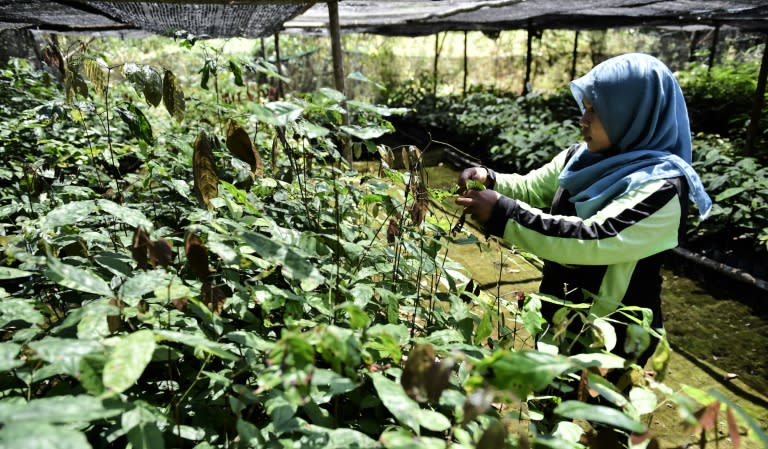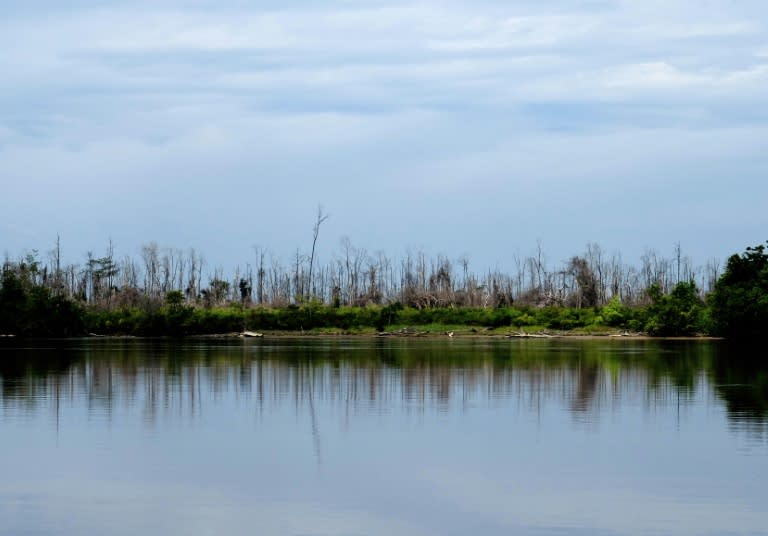Borneo loggers swap chainsaws for cheap healthcare
The forest around Manjau in Borneo once reverberated with the scream of chainsaws, as gangs of illegal loggers felled ancient hardwood trees for sale to timber merchants downstream. But many loggers in the remote Indonesian village are hanging up their chainsaws in return for affordable healthcare, through a community incentive scheme that aims to save lives and protect Borneo's fragile rainforests. This strategy is set to be rolled out elsewhere in Indonesia, where impoverished communities often reliant on illegal industries for survival are putting enormous strain on the environment. In western Borneo, where the approach was first pioneered, logging had long been the lifeblood of many communities, providing quick cash whenever it was desperately needed for weddings or health emergencies A single Bornean ironwood -- a rare, slow-growing giant prized for its durable timber -- could fetch hundreds of dollars at a lumber mill, a small fortune for local villagers. But for Juliansyah, a father-of-two from Manjau, the income was unreliable and the work -- often involving days-long missions alone in the forest -- was tiring and dangerous. The cash was gone as soon as it had been earned, spent on medicine, school books or other essential items, he told AFP on the edge of Gunung Palung National Park. “One day you’re rewarded, the next there’s nothing. You cannot save anything,” explained Juliansyah, who like many Indonesians goes by one name. It is illegal to cut down trees inside the park, a critical habitat for endangered orangutans, sun bears and hornbills in southwestern Borneo, a biodiverse island shared between Indonesia, Malaysia and Brunei. His village was eventually approached by Alam Sehat Lestari (ASRI), a non-profit organisation based in nearby Sukadana and made an unusual offer. If they agreed to cease logging, the entire village would be granted discounts on medical bills at the local health clinic, and free training for new careers as forest custodians and farmers. - Villages onside - The incentives have worked, says American physician Kinari Webb, who co-founded ASRI and established Oregon-based charity Health in Harmony, its key financial backer. Of the 24 villages surrounding Gunung Palung, all but one have agreed to put down their chainsaws, Webb said. Since 2007, when ASRI started working with villages, the number of logging households has plunged from nearly 1,400 to 180. The rampant destruction of the old-growth forest Webb encountered when she first arrived in western Borneo 22 years ago has slowed to a trickle, with degraded areas slowly regrowing. "There was pretty much never a day standing right here that you couldn't hear a chainsaw in that forest,” Webb told AFP, gesturing to the lush greenery behind the clinic. “Now, occasionally you will still hear a chainsaw... But it’s a completely different scene.” The clinic, where patients watch videos on forest conservation while waiting to see a doctor, has evolved into the primary healthcare provider for around 60,000 people living alongside Gunung Palung. Nearly 7,300 villagers received medical treatment at the clinic in 2015. But that caseload is set to balloon when a modern hospital -- equipped with operating theatres, a blood bank and vaccine fridges -- opens in October. “Green villages”, or those that stop logging entirely, are granted 70 percent reductions on treatment. Yellow and red villages -- which are on track to stopping logging -- receive 50 and 30 percent discounts respectively. But anyone who cannot afford healthcare can offset the cost by collecting seeds for replanting in degraded forest, said Farida, who manages a nursery of native saplings outside Sukadana. - Challenges ahead - In April, ASRI co-founder doctor Hotlin Ompusunggu won a 50,000 pound ($65,700) grant from the Whitley Fund for Nature at an award ceremony attended by legendary naturalist David Attenborough. The prize money -- the second significant endowment gifted to ASRI by the Britain-based charity -- will help fund the scale-up of the project. Communities on the islands of Sulawesi and Sumatra, and in the eastern region of Papua, who are dependent on industries like mining and blast fishing have been canvassed, with a second launch site expected to be announced in January. Webb said one possible location is Raja Ampat, a string of idyllic islands in Papua famed for marine biodiversity. Villagers there have been dynamiting the pristine reef to make ends meet, jeapordizing their future livelihood, she said. There are always setbacks. Satellite imaging, observed by forest guardians who keep a close watch on communities, revealed in June that Juliansyah’s village had cleared protected land inside park boundaries. The village will be downgraded to yellow but can always redeem itself, said Fransiscus Xaverius, who oversees reforestation projects around Gunung Palung. On a dirt road separating the protected park from a massive palm oil plantation -- another source of pressure on Borneo’s forests -- a motorcyclist drives past with a load of ironwood slats, likely carved from a felled stump, said Xaverius. "It's very challenging if you want to do conservation work in Borneo," he told AFP, as tankers carrying crude palm oil thundered by. "On the one hand there's people who want to save the forest, and on the other there's people who want to survive."






